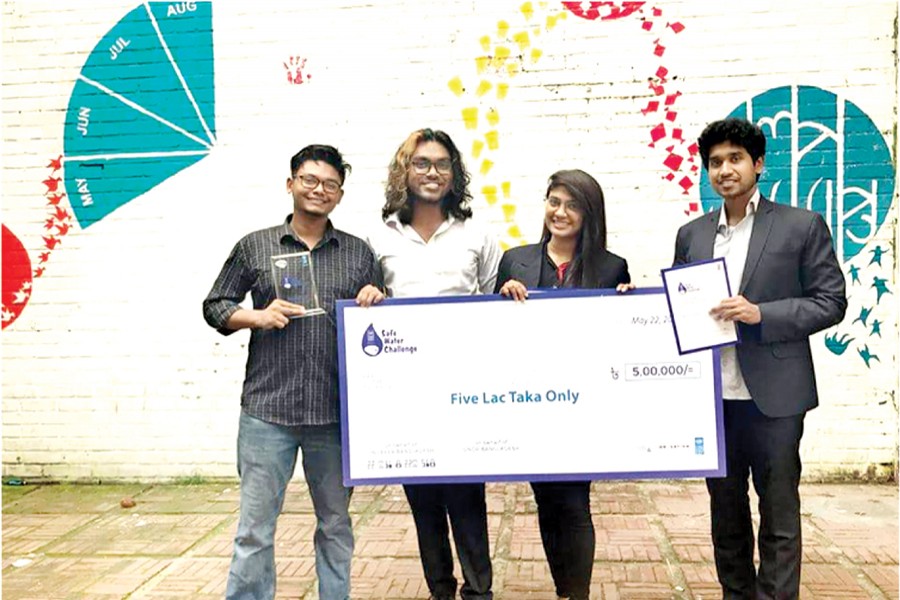Future leaders work on ways to solve safe drinking water challenges

Published :
Updated :

The first-ever 'Safe Water Challenge' has come to an end with Team Tetra from Bangladesh University of Engineering and Technology (BUET) winning the title. Unilever Pureit and UNDP Bangladesh jointly launched the contest with the aim of finding ways to solve safe water challenges in rural areas of Bangladesh.
About the competition
The challenge was to ensure safe water for the salinity affected people living in the coastal region. The primary objective of UNDP and Unilever Pureit was to create an impact of SDG 1, 6 and 11 which can change the lives of 170 million people.
The task was to solve the problems of Deluti union which is a severely affected area of Khulna, and the main issues were the inaccessibility of pure water sources; wastage of time of rural women for collecting drinking water from a distant place, health hazards etc.
A total of 130 teams from the whole country participated in the first round which was an online round; the teams submitted the abstract of the case of Deluti union.
There were three criteria for judging: innovation, awareness and sustainable business model.
From this initial screening, ten teams qualified for the grand finale, and they had to attend a workshop where various strategies and suggestions were discussed, and after a week they were asked to give the presentation before the jury.
The grand finale
The grand finale was held on the May 22, 2018 in the innovation hub of UNDP office in the capital’s Agargaon area. There were many high profile guests from Unilever, UNDP, WaterAid, banks and corporate sector.
The top ten teams were given five minutes to present their ideas, and 10 minutes for questions and answers (Q&A) session. According to the winning team, this round was the toughest because of the challenge of answering the questions for such a long time in front of such an experienced jury board.
The judge panel in the final round included Tanzeen Ferdous Alam, marketing director of home care at Unilever Bangladesh; Shaila Khan, acting country director at UNDP Bangladesh; Tahsina Banu, country head of international commercial banking at HSBC; Pulak Barua, head of research and development at Unilever Bangladesh; Nowroz Ahmed, head of air and water business at Unilever Bangladesh; Arif Mohammad Faisal, programme specialist for environmental sustainability and energy at UNDP; Laikath Ali, director of programme and policy advocacy at WaterAid; Shahriar Rahman, head of strategy at Adcomm limited.
The top ten teams that qualified for the grand finale were: Jibon, Ingenious, Aquifer, Tetra, Probaho, SUST Innovation Geeks, Medicare Health, IUBAT Sparks, Change Makers and Md Shariful Islam Chowdhury (individual). Among them, team Tetra from BUET was announced the winner.
Listening to the champions
The champions, Team Tetra, consisted of four BUET students, Sabrina Rashid Sheonty (fourth year, Water Resources Engineering), Mubasshir Tahmid (fourth year, Naval Architecture and Marine Engineering) and (fourth year, Mechanical Engineering). They also had a silent member in the team, Asif Hossain Tamim (fourth year, Naval Architecture and Marine Engineering, BUET) as maximum three persons were allowed in one group.
Their final project was a device named 'Atoshi' which can desalinate and purify water simultaneously using the power of solar energy. It can desalinate eight to ten liters of water daily which is enough for a four-member family.
It is made of locally available materials and costs Tk 1,600. It is affordable to low-income people of salinity affected area. As it uses the renewable energy, it is environment-friendly too.
Asked about their experience, Sabrina Rashid Sheonty described, “We had the privilege of working with this project for years for HULT prize and had the experience of presenting the idea in front of a bunch of international judges.”
“However, our experience of the whole competition was quite challenging because the grand finale was held during our midterm week of BUET. We had to miss classes and tests to prepare for this competition. But at the end of the day, all the pains seemed worth it after winning the title,” Sabrina added.
Collaborating with UNDP and Unilever Bangladesh, they are now going to launch the product at Khulna. Their initial meetings are done, and they are working in full swing to prepare the product for the market.
Sabrina further added, “After winning the challenge, we feel more responsibilities to work for the salinity affected people.”
“After the workshops and meetings, we have learned how to make the market strategy analysing the consumer behaviour and prepare a sustainable business model with innovative technology. We are very much confident with our product and would like to thank UNDP and Unilever for their assistance,” Sabrina opined.
Sabrina Rashid Sheonty felt positive about the mentorship they received. In her words, “The main takeaway for me was the connectivity with the experienced leaders working in corporate and development sectors.”
“We, the young minds have the technology and the idea. But we lack the resources and marketing strategy to convert the technology and idea into a marketable product and reach the consumers. If young stars like us are funded and mentored by such experienced and big stakeholders, there will be many more promising entrepreneurs all around the country who can create a strong impact in changing the lives of millions," Sabrina commented.
The writer is a first year student of BBA programme at the Institute of Business Administration (IBA), University of Dhaka. He can be reached at
rashikriasat404@gmail.com


 For all latest news, follow The Financial Express Google News channel.
For all latest news, follow The Financial Express Google News channel.